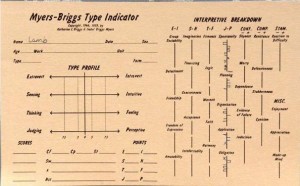Do You Know Your Type?

Twillman is an INFP in an INTJ organization. Which, he says, can be hard.
He first found out about Myers-Briggs as a graduate student at Johns Hopkins University in 1977. Since then, he’s been, as he describes it, “an active player in psychological type.” He has served on the Association of Psychological Type board and has helped make the EPA one of the most active agencies in promoting the Myers-Briggs.
“I gave the test to someone I met on the first date,” Twillman says. “Now we have two children and are happily married.”
Like many other enthusiasts, he describes himself as a “type watcher” — someone who takes pleasure in guessing strangers’ MBTI personality types. A common line from supporters is that the test starts an important dialogue around who we are and how we interact with others.
The Washington Post has an in-depth look at the Myers-Briggs test and whether or not it’s valuable. I recall taking the test a decade ago sometime in college, but don’t recall my type, which probably means I didn’t find the results to be very valuable. Logan took the test last year and said that her results were “sooo right on,” and when she described her type to me, I laughed because it basically described her to a T. It’s sort of like reading your horoscope and being surprised by how many of the details match up to your real life. Do you know your type, and do you find knowing your type to be valuable?
Support The Billfold
The Billfold continues to exist thanks to support from our readers. Help us continue to do our work by making a monthly pledge on Patreon or a one-time-only contribution through PayPal.
Comments